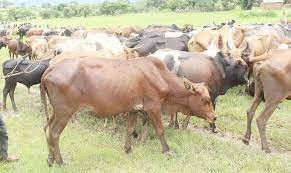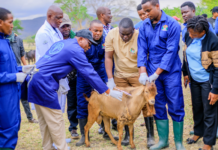Swine Fever among other animal diseases have continued haunting Zambia, threatening the agriculture sector, the new country’s economic growth lifeblood, fueling concern over country’s prospects of maximizing export revenue from the sector next year
The foot and mouth disease, Contagious bovine pleuropneumonia (CBPP), affecting chiefly cattle has also been common in recent months in the livestock sector, according to recent reports by experts.
According to the Livestock Survey report conducted by the Ministry of Agriculture in partnership with the Zambia Statistic Agency -ZAMSTATS for 2022, the diseases have continued to be the major threat to the livestock sector with Southern Province being the main area where the ailment has persisted.
Livestock minister Makozo Chikote who launched the report is concerned at the escalating cases of the foot and mouth, among other diseases seeks urgent remedies determine and combat the diseases affecting the livestock sector and promote its productivity.
He encouraged a continuous animal stock taking in the sector to ensure evidence based and effective service delivery. Surveys are critical for the development of the sector and enhancement of it’s contribution towards the Gross Domestic Product -GDP, he is cited as saying by Zambia Agriculture and Information Service (NAIS), a Government agriculture news agency.
And ZAMSTATS Interim Statistician General, Mulenga Musepa appealed to policy makers to take interest in results from surveys conducted in various ministries for the benefit of the country.
He notes the gap between information disseminated and its critical application of data obtained from survey and researches as the surest way of overcoming such concerns.
And the ban slapped on the movement of cattle in Chisamba and Chibombo districts in Central Zambia to avert cross-infection of livestock with the Contagious Bovine Pleuropneumonia -CBPP- and other livestock diseases has been lifted, says Department of Veterinary Services Assistant Director, Paul Fandamu.
Dr. Fandamu said the department is just waiting for the gazette for the animals in the said areas to start moving freely.
The government has done away with the escort fees that were payable to veterinary officers because the cases of Foot and Mouth Disease -FMD- have significantly gone down.
The responsible ministry had earlier issued a statement announcing the discontinuation of the escort fees to ease the costs incurred by livestock farmers.
Ministry of Fisheries and Livestock Director of Human Resource and Administration, William Katongo describes the Central Province as being key to livestock sector because of the huge cattle population.
In recent years, Zambia’s veterinary authority has intensified monitoring of cattle-related diseases and vaccinated over 11,000 herds to avert the spread of the ailment.
Meanwhile over 28,000 small scale farmers in Southern and Western Provinces are in the next three years expected to benefit from a Germany Government funded food security project aimed at improving agriculture production says Southern Province Agricultural Officer Paul Nyambe.
The project seeks to improve improve the dietary diversity among small scale farmers through crop diversification. It also seeks to improve and increase household income among the same farmers through market linkages, according to a statement seen by FRA.
In a related development, an agricultural produce bulking centre to be operationalized soon in Chief Musokotwane’s area in Southern Zambia, near the border with Zimbabwe and valued at US$131,000 has been set up to assist farmers grind their maize and add value to the commodity and other field crops.
The centre is being supported by the Strengthening Climate Resilience in Agricultural Livelihoods in Agro-Ecological -SCRALA, according to Kazungula District Agricultural Supervisor, Catherine Bwali.
Finance minister Situmbeko Musokotwane in announcing the US$11 billion national budget for the fiscal year 2023 which has since been approved by Parliament, pledged to revitalize the sector as being one of the growth areas of the country.
This follows appeals by various players urging the Government to the sector, chiefly in Agriculture Research Centres as well as its development as a surest way of revamping the economy.
Zambia United for Sustainable Development (ZUSD) President Lazarus Chisela noted the need to increase financing to the sector noting that last year the budget did not address challenges faced by the sector despite its growth potential if harnessed.
“Zambians are capable of feeding themselves and earning an income if the Government can concentrate on funding research centres such as Mount Makulu in the 2023 budget. Previous budget for 2022, did not address challenges facing the agriculture sector especially research centres which is not supposed to be the case in the next budget of 2023” he said.
It urged the Government to recruit more agriculture extension officers next year to ensure agriculture related concerns are redressed through engaging various players that have the capacity to contribute equipment and other resources.
“Let Government promote sustainable agriculture under ZNS (Zambia National Service), Defence and Zambia Police. We want to discourage the Government from exporting maize and instead as a country, let us export products such as mealie meal and create jobs for our locals,” Mr. Chisela said.







